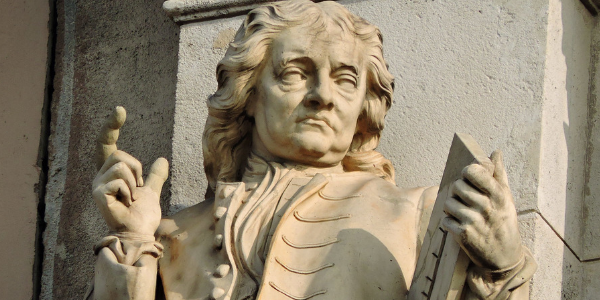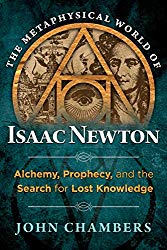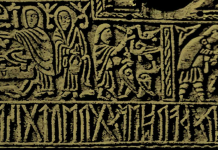
The Metaphysical World of Isaac Newtown: Alchemy, Prophecy, and the Search for Lost Knowledge, by John Chambers
Destiny Books, 9781620552049, 470 pp., 2018
How many people have successfully held the title “genius” through the centuries? Isaac Newton certainly has maintained it well, as his innovative legacies continue to impact our past, present, and future. He is credited with proving the existence of gravity, transforming math by developing calculus, and transforming astronomy by inventing the first reflecting telescope. His book Philosophiae Naturalis Principe Mathematica shifted the scientific paradigm of his time with theories of laws of motion, which upheld the validity of the heliocentric model of the universe, and paved the way for the industrial revolution that followed. Principia Mathematica is often cited as one of the most influential works in history.
However, what is less commonly known is that Newton dedicated as much time to theological pursuits as his scientific discoveries. The Metaphysical World of Isaac Newton: Alchemy, Prophecy, and the Search for Lost Knowledge by John Chambers is a thorough look at recently discovered theological writing of Newton, which remained a secret during his lifetime.
It was only in 1936 when Nazi Gerard Wallop, who had inherited the trunks that contained these hidden writings, needed money that these secret writings of Newton came to light. When the writings were auctioned off, Professor Abraham Yahuda and economist John Maynard Keynes purchased the bulk of the material. Both influential men shared what they were discovering in the paper with their well-connected social groups. Yahuda was interested in proving Newton was closer to Jew than a Christian and Keynes believed Newton was more of a magician than scientist. Soon enough, scholars gained access to the papers and began to discover this hidden world of Newton’s theological thoughts as well, which is adding a new dimension of Newton to academic research. Chambers does an exquisite job of contextualizing Newton’s writings in history, sharing with the reader the content of these manuscripts and providing a very well researched explanation of the importance of this work.
The topics covered in these writings are primarily centred upon Newton’s belief that God and Jesus were not the one. This denunciation of the trinity was considered blasphemous when Newton was alive. If discovered, the contents of these theological writings would have screamed heretic and Newton life, despite his valuable contributions to society, would have been at stake under the paranoid, mistrustful and controlling religious authorities. Nevertheless, he maintained correspondence about his ideas with the notable philosopher John Locke, and these letters are analyzed by Chambers.
It is fascinating that Newton applied the same methods of vigorous study towards science into examining hundreds of religious texts, dating back to the Council of Tyre and Council of Nicea. He strongly sought to debunk religious text such as Athanasius’s Life of Anthony, which was a best seller in the Roman Empire about the feats of St. Anthony, to demonstrate “orthodox Christianity of the fourth century AD, Newton is saying, was built on many lies.”1 Yet, unlike many scientists, Newton wasn’t trying to prove the non-existence of God. Rather he was scrupulously examining all the holes, fallacies, and lies perpetuated by the corrupt Roman Catholic Church. Newton was a dedicated believer and reverent religious scholar who did not want to cut any corners.
Diving into Newton’s theories and writing in The Metaphysical World of Isaac Newton is quite an adventure. According to Newton, through his combination of thorough theological research and his mathematic skills, the apocalypse, or end of man, will occur in 2060. Detailed by Chambers is how Newton proved the existence of gravity and our place in the universe through Hailey’s Comet, which had a lot more to do with astronomical theology than one might realize. Along with his astronomical theology beliefs, Newton also wrote “Chiron the centaur had created the first star globe” and cited astrological and mythological proof to uphold this claim.
((p. 284)) Newton also took on finding the truth about Noah and the great flood, for which he concluded Noah became the god Saturn, and also Janus. He stated:
Worshipping the sun, the known planets, and the four elements, mankind began to honor the memory of his most illustrious ancestors by naming planets after them. Finally mankind, believing that the souls of his ancestors had transmigrated to these planets, began to worship them as gods.2
Newton’s theology was interesting, but dense. I was excited when midway through the book it switched to a topic I was more inclined to want to read: Newton’s writing in regard to his alchemical work. One of the writings, which is discussed in depth by Chambers, is about how Newton believed the myth of Mars and Venus being caught in a net by Vulcan when making love was actually the tainted form of the recipe for creating Net, one alchemical step needed for the Philosopher’s Stone. In alchemy, Venus was equivalent to copper, Mars to iron, and Vulcan to fire. Mixing these ingredients was the recipe for Net, yet Newton took it even further by stating “the formula itself was a corruption of some far more ancient aspect of the prisca sapientia — the original, primal religion of mankind” that related to his theories of astronomical theology. For Newton, the Net story was a myth, alchemical story, and an astronomical event all at the same time. Newton’s quest to discover the Philosopher’s Stone was related to both his theological beliefs and alchemical inclinations. He wrote, “Alchemy was the memory of God’s most ancient activities in the world; as such, it had to be not only respected by feared.”3
These brief summaries of some of Newton’s deepest theological thoughts I have so far mentioned is hardly a synopsis of the close to 500 page book. This is no light read. I have gone through it slowly for close to nine months, digesting the tedious details in small bits. Though I have studied both theology and philosophy through my academic career and practice astrology professionally, I was consistently bombarded with new information about all of these topics. Chambers, who unfortunately has passed since this book was published, has done a tremendous job of documenting his historical research and bringing it together for a cohesive and insight look into the theological studies of Newton.
I find it astounding that more than 400 years later, we are still learning from Newton. While some may say his writings are antiquated, I believe they are absolutely fascinating to study. It is very insightful to know what Newton thought of the Roman Catholic Church hundreds of years ago, and what his own beliefs about God were given his great scientific knowledge. Reading the perspectives of Newton, a well-rounded and highly intelligent scholar, makes you think twice about how you relate to God, the cosmos and your own theological musings. I highly recommend The Metaphysical World of Isaac Newton for anyone interested in ancient history, science, astronomy, alchemy or theology.
Photo Credit: Dimitris Kamaras









